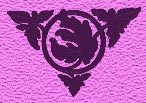Kay Thorpe's Curtain Call
 In
Thorpe's traditional Harlequin
novel, the naive heroine, Kerry West is an actress trying out for the
part of Charmian in Antony and Cleopatra. The hero, Ryan
Maxwell, is of course the lead actor and established star who plays
Antony. Rather predictably, Kerry is critical of the lead actress's interpretation:
In
Thorpe's traditional Harlequin
novel, the naive heroine, Kerry West is an actress trying out for the
part of Charmian in Antony and Cleopatra. The hero, Ryan
Maxwell, is of course the lead actor and established star who plays
Antony. Rather predictably, Kerry is critical of the lead actress's interpretation:
There was something in her interpretation of
Cleopatra, even now emerging, which Kerry herself did not care for.
Unless she was very much mistaken, the lovely and temperamental
actress saw her role as that of twin protagonist. And that,
temptation though it undoubtedly was, was entirely wrong because
Shakespeare himself had intended only one--Antony. (37-38)
Kerry's complete faith that the play belongs to
Antony does, however, jar with her assertions in several places that
it is the ultimate love story -- "a vision of perfect love
between two people who have experienced almost all that life has to
offer" (20). And of course her investment in Antony is
ultimately personal because of her feelings for Ryan.
His take on the play is rather more interesting
because he deflates the romanticism in it by pointing out that both
are "totally unscrupulous in their ambitions"(20). His
later elaboration of his interpretation of the play and Cleopatra
suggests that, despite his presence in a Harlequin novel, Maxwell
espouses the more opportunistic view of that relationship that Linda
Charnes actually opposes to the Harlequin-style ideology of romantic love:
Cynicism touched his mouth. 'I mean for what she
is and never ceases to be: wanton, possessive, and totally ruthless.'
'Oh, no, that's not true!' Kerry's voice was
impassioned, the identity of her advisor forgotten for the moment.
'At first, yes, she is all those things. But not after Antony dies.
She kills herself for love!'
'She kills herself,' Ryan returned evenly,
'because her pride and vanity cannot accept the degradation planned
for her by Caesar. Certainly she's toyed with the idea before, but it
isn't until Dolabella confirms what her instincts have told her that
her resolve finally hardens ... Shakespeare conceived her as a woman
of shallow nature, and that's how she should be played. It wouldn't
be a popular interpretation but it would be a true one.' (70-71)
These observations, not surprisingly, daunt both
young actresses to whom he speaks. His niece then worries whether he
can play opposite an interpretation that he does not believe, but
Maxwell acknowledges that "Cleopatra has been idealized for so
long in the theatre, it would take a very brave actress indeed to try
putting her across in any other manner but the accepted one' (71). In
his own way, Maxwell is making precisely Charnes's point that the
ideology of sacrifice for love obscures the actual decisions made in
the play. Of course, he does so within the very genre that Charnes
identifies as promoting that pernicious ideology.
Just as important, the novel enacts the
theatrical problems of interpretation identified by the two principal
lovers. Paula Vincent, the beautiful, experienced actress playing
Cleopatra and trying to play Ryan, does well in the first two acts
but cannot achieve the necessary transformation into great love
required in the third section of the play (as staged by this
director). Her reviews praise the first part of her performance but
not the last. Just as important, when she tries to scuttle the
performance by conveniently claiming a migraine and refusing to go
on, Kerry is drafted into playing Cleopatra. Initially terrified of
the task and hesitant in her performance, she "grows" into
the role as play progresses (with Ryan's support, of course). Her
final act is spectacular because she has decided to play her love for Ryan.
In effect, the novel solves the problem
expressed in the conflicting readings of Cleopatra's nature by
splitting her role between the two actresses. Although the book
ultimately does espouse the "romantic" reading of Cleopatra
that Ryan asserts is inescapable convention, Thorpe also encodes the
opposing reading within the classic Harlequin plot.
Go to Introduction / References
by Play / Return to Actress Novels

 In
Thorpe's traditional Harlequin
novel, the naive heroine, Kerry West is an actress trying out for the
part of Charmian in Antony and Cleopatra. The hero, Ryan
Maxwell, is of course the lead actor and established star who plays
Antony. Rather predictably, Kerry is critical of the lead actress's interpretation:
In
Thorpe's traditional Harlequin
novel, the naive heroine, Kerry West is an actress trying out for the
part of Charmian in Antony and Cleopatra. The hero, Ryan
Maxwell, is of course the lead actor and established star who plays
Antony. Rather predictably, Kerry is critical of the lead actress's interpretation: